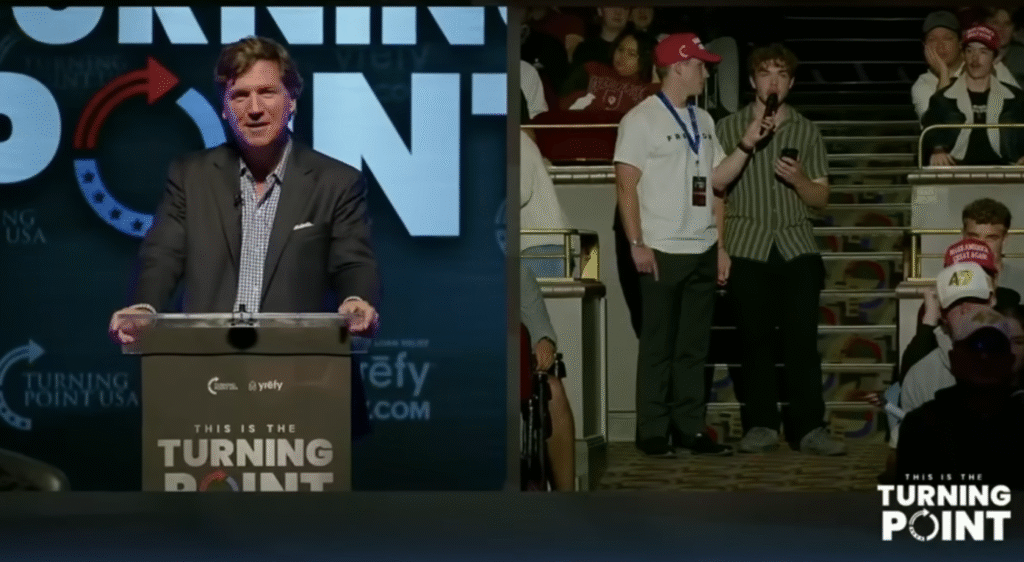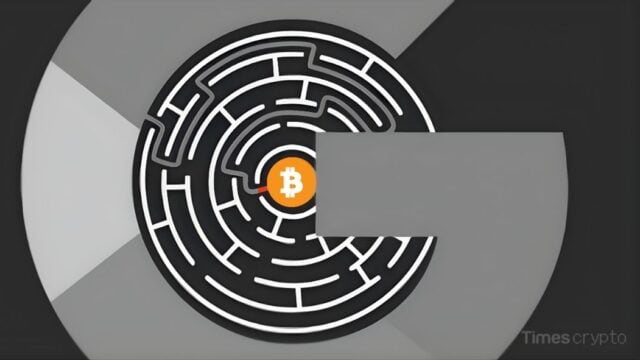Key Takeaways
- Tucker Carlson publicly stated he believes the CIA created Bitcoin during a Turning Point USA event.
- Although he admires Bitcoin for its principles of financial autonomy, he refuses to invest due to its mysterious origins.
- The crypto community has largely dismissed his claims, pointing out Bitcoin’s open-source nature and global adoption.
Table of Contents
Conspiracy Theory Resurfaces in Mainstream Discourse
In a controversial speech that has generated widespread discussion this week, commentator Tucker Carlson has openly suggested the theory that the CIA created Bitcoin. Speaking at a Turning Point USA event to honor Charlie Kirk, Carlson outlined his reluctance to invest in Bitcoin despite acknowledging its merits.
“I grew up in DC primarily, in a government family. So, CIA. That’s my guess. Can’t prove it,” Carlson told the audience, expressing his skepticism regarding Satoshi Nakamoto’s mysterious identity and the untouched Bitcoin fortune worth approximately $120 billion.

Read also: The Real Satoshi Nakamoto? Hal Finney’s Old Photo Sparks Excitement Over Bitcoin’s Creator
Praising Principles While Rejecting Investment
Despite his conspiracy theory about who he thinks the creator of Bitcoin is, Tucker Carlson expressed admiration for Bitcoin’s core philosophy. He specifically praised the financial autonomy crypto provides nowadays, stating, “I don’t want what I buy or sell to be tracked. I don’t want my money to be tracked.”
His paradoxical point of view, applauding Bitcoin’s ideals at the time he suspects its origins, demonstrates the complex relationship many traditional commentators, public figures, and even a wide portion of the population have with decentralized digital assets, embracing the concept but distrusting the execution.

Read also: Quantic Bitcoin ‘BTCQ’ Emerges as Quantum-Resistant Crypto Challenger
Investigating the True Origins of Bitcoin
Although Tucker Carlson promotes the narrative that the CIA created Bitcoin, there are good reasons to consider other possibilities. As a response, the crypto community has largely rejected his claims, pointing out that Bitcoin’s open-source code and decentralized nature make ‘agency control’ theoretically impossible. Moreover, Bitcoin’s use in countries opposing U.S. interests contradicts the CIA theory, as the agency would never develop a tool that could be used extensively by geopolitical enemies/countries with opposing interests. So far, nobody knows.
The Search for Satoshi: Key Candidates
- Satoshi Nakamoto: The pseudonymous creator(s) who published the Bitcoin whitepaper in 2008 were in communication with developers until 2011 before vanishing.
- Hal Finney: Early Bitcoin contributor and the first transaction recipient, is considered the most credible candidate for being Satoshi, even after passing away in 2014

- Nick Szabo: Computer scientist who created “bit gold,” a predecessor to Bitcoin, and whose writing style matches Nakamoto’s.
- Dorian Nakamoto: Japanese-American physicist who denied involvement despite media speculation in 2014.
- Craig Wright: Australian computer scientist who claims to be Satoshi but has provided questionable evidence to back up his story.
- Jack Dorsey: Twitter co-founder and actual CEO of Block. Circumstantial patterns and timing, technical expertise, and motive, along with his curriculum, make him a notable candidate. Though he always denied these allegations.

Read also: Crypto Social Engineering Scam Costs Victim $91M in 783 Bitcoin Heist
A Divided Perspective on Digital Assets
The claims by Tucker Carlson that the CIA created Bitcoin exemplify a larger skepticism toward digital assets among some political commentators and other public personalities. While Carlson worries about the risk of potential “totalitarian control” through crypto, his theory fails to appreciate Bitcoin’s core architecture as a transparent, decentralized network that operates independently of any central authority.
So far, the controversial debate highlights how Bitcoin continues to provoke passionate reactions across the political spectrum, even while standing strong and establishing itself as a mainstream financial asset.
FAQs
What evidence supports Tucker Carlson’s theory that the CIA created Bitcoin?
Proponents point to Satoshi Nakamoto’s mysterious identity and the Japanese name potentially hinting at “central origin,” though most consider this circumstantial. The CIA did pay early developer Gavin Andresen $3,000 to educate them about Bitcoin in 2011, suggesting they were learning about it rather than having created it.
Why does the crypto community dismiss Carlson’s claims that the CIA created Bitcoin?
Bitcoin’s open-source code allows anyone to verify its operations, and its decentralized nature means no single entity controls it. Additionally, hostile nations and even criminals use Bitcoin, making CIA creation counterintuitive to U.S. interests.
Has Carlson completely rejected crypto?
No, while refusing Bitcoin investment, Carlson has supported crypto advocates like Roger Ver and acknowledges Bitcoin’s value for financial privacy, creating a contradictory position that embraces the concept while distrusting its origins.
For more Bitcoin-related stories, read: DL Holdings and Antalpha Powerful $200M Gold and Bitcoin Strategy Partnership







